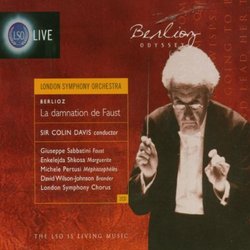| All Artists: H. Berlioz Title: Berlioz: La Damnation DE Faust Members Wishing: 0 Total Copies: 0 Label: Lso Live Release Date: 6/11/2002 Album Type: Import, Live, Original recording reissued Genre: Classical Style: Opera & Classical Vocal Number of Discs: 2 SwapaCD Credits: 2 UPC: 822231100829 |
Search - H. Berlioz :: Berlioz: La Damnation DE Faust
 | H. Berlioz Berlioz: La Damnation DE Faust Genre: Classical
|
Larger Image |
CD DetailsSimilar CDs |
CD ReviewsA heavenly way of going to Hell MartinP | Nijmegen, The Netherlands | 02/01/2003 (5 out of 5 stars) "What a dazzling work this is! It is one of those rare pieces of music over 2 hours long where the level of invention is sustained at an exalted pitch from beginning to end - or well, almost to the end. One 'hit' follows another, colourfully contrasted and most of them blessed with a memorable tune. Berlioz is equally adept at invoking a drunken student brawl or a girl languidly combing her hair while singing a melancholy `Gothic ballad`; he lets us share in the festivities of sociable peasants as well as in the tormented loneliness of Faust, who tries in vain to derive some comfort from Nature's grandeur. It's only at the very end, after Faust has plunged into the Abyss, that things go somewhat awry. The Pandaemonium, featuring demons singing Swedenborgian gibberish with lots of Germanisms, tends to invoke smiles rather than shivers in the modern listener; and Marguerite's redemption is only for those with a musical sweet tooth (is this where Fauré got his `In Paradisum', I wonder?). Colin Davis, however, even succeeds in rendering these two final pieces convincing, so you can imagine what the rest of this recording is like: absolutely brilliant. He coaxes the LSO's velvety strings, penetrating brass and virtuoso woodwinds into such a total identification with Berlioz's score and the world it invokes, that for once I have no trouble forgiving him that his coaxing is often rather audible. Davis, with the likes of Inbal, Gergiev and Ashkenazy, is a singing conductor, which makes headphone listening less enticing, though in this case the intrusions are not too numerous outside recitatives. The other great attraction (the first is the orchestral playing, not Davis's singing) are the chorus, who plunge into their many shifting roles with great abandon. The student's song in Auberbach's tavern can hardly ever have sounded more drunk, with a raucous trill liberally inserted on the final Amen of the fugue. For the choir singing at the way cross in the Ride to the Abyss, Davis has his singers adopt an uncultivated voice and deliberately mispronounced Latin, which greatly enhances the already highly sinister atmosphere - as does their heartfelt `cri d'effroi' when Mephistopheles runs them underfoot! The soloists are well up to standards, though frankly I feel they are somewhat outclassed by the orchestra and the chorus. Sabbatini (Faust) has a solid tenor voice, but sounds too Italianate and operatic for my taste; anywhere over high A he sounds strained, sometimes unpleasantly so. Also, he might have cut down a bit on the `sob' in his voice. Shkosa is a creamy-voiced Marguerite, who you're not likely to mistake for a virgin; a less dramatic, more girlish voice in the vein of Susan Graham for Nagano would have been preferable. Pertusi's Mephistopheles however is excellent; whether you prefer his stress on the bestial, brutal side of the character to the unctuous sarcasm adopted by Van Dam on Nagano's set is mainly a matter of taste. The third wonder of this recording is the sound quality itself. The recording level is fairly low, so you may need to turn up your volume a bit higher than usual, but once you do that there is a level of detail here and a dynamic profile you will be hard put to find even in the best studio recordings. There is perfect transparency in the gossamer dance of the sylphs and the mysterious dance of the will-o'-the wisps (where the woodwinds excel in the virtuosic final presto, delivered hands down); Marguerite's great aria `L'amour, l'ardente flamme' seems suspended in both time and space and subsides into the faintest whisper; yet the military power of the Hungarian March asserts itself most forcefully, as do the demons later on when they allow us to peek into Hell for a few moments. Davis, by the way, saves this penultimate scene from being slightly ludicrous by adopting a suitably frantic speed, stressing the madness of it all. The thunderous presence of the bass drum, such a rare commodity in the world of sound recording, is a great help too. Solo singers are not spot lit but naturally integrated in the soundstage. The final miracle of this recording is that it is ridiculously cheap. You'd better come up with a very good excuse if you don't buy it!" Berlioz and the LSO Score Again Aronne | 01/24/2009 (5 out of 5 stars) "This is an amazing set. After enjoying Herold in Italy, Tristia, and the Symphonie fantastique, I wondered if "La damnation de Faust" would carry the same interest.
It would. This music is some of Berlioz's best: vivid, exhilarating and, when necessary, beautiful, The Damnation of Faust scores some major points in the realm of music. The drinking chorus "A boire encore!" is amazing. Faust's dream scene is ethereal, the final chase before his damnation graphic in the most positive sense of the word. The performance is as scintillating as the music. Sir Colin Davis, renown Berlioz interpreter, conducts the London Symphony Orchestra (LSO) extremely well. Both are in top form. The work has only four roles. Much depends upon the tenor, in this case the Italian tenor Guiseppe Sabbatini, as Faust. I marvel at his control of his head voice. He manages to reach his notes wondrously well, never actually "strained" from my point of view. Mezzo-soprano Enkelejda Sckosa is an excellent Marguerite. She and Sabbatini get some splendid singing going in the duet material. Special praise must go to bass Michele Pertusi as Mephistopheles. His control of his notes and faultless expression make listening to his contribution a pleasure. It is easy to conceive him as the devil, though, as his profile picture in the book reminds us, he looks nothing like his part. David Wilson-Johnson takes the minor bass part of Brander (who gets one song plus a few lines), doing very well. His voice is different enough from Pertusi's to tell them apart. LSO Live, aside from being relatively inexpensive (far less expensive in the UK), also gives complete libretto and translation for the work at hand, supplying the usual essay and synopsis as well. Nothing stands between a Berlioz fan and the treasuring of this recording, a key recording according to the Penguin Guide and rightly so!" |

 Track Listings (18) - Disc #1
Track Listings (18) - Disc #1



